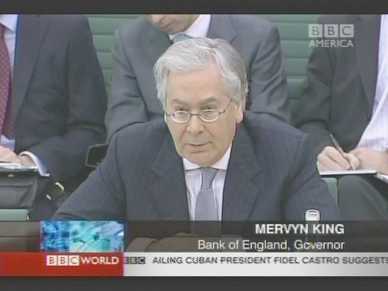
Dynamics

|
Generational Dynamics |
| Forecasting America's Destiny ... and the World's | |
| HOME WEB LOG COUNTRY WIKI COMMENT FORUM DOWNLOADS ABOUT | |
Commentators were stunned Tuesday, when the ECB offered "unlimited" funds at low interest rate to a wide variety of European banks. The fixed 4.21% interest rate was substantially lower than borrowing rates otherwise.
By the end of the day Tuesday, the ECB had flooded the market with $500 billion of new liquidity. Furthermore, banks borrowing this money were allowed to put even mortgage-backed securities up as collateral.
The catch? It's a two week loan. It has to be paid back to the ECB - with interest -- at the end of two weeks.
The ECB's purpose is to make sure that banks have plenty of money to lend right now, since banks need plenty of liquidity at year end to meet potential regulatory requirements.
This ECB auction comes on top of the "Term Auction Facility (TAF)" auctions that were jointly announced last week by many of the world's major central banks.
The global economy is like a drug addict that needs a bigger and bigger "kick" each time. In August, a ½% interest rate reduction sent investors on a buying orgy. By October, an interest rate reduction had no effect at all, and last week's interest reduction was met with international scorn and ridicule.
So now the ECB has really poured it on, with this huge $½ trillion injection of funds in one day.
 |
Did it have the desired effect? It was hardly noticed on Wall Street. But in Europe it actually caused a great deal of fright.
On the BBC world business report on Tuesday morning, here's how the anchor, Aaron Heslehurst, opened his report:
Mervyn King, the Governor of the Bank of England, was testifying on Tuesday to the Commons Treasury Committee. He said that the central banks had to act to dispel lenders' fears:
 |
Oddly enough, King says that banks are "awash with cash," but they're afraid to loan money to other banks.
The fear arises over possible new losses on CDOs and other mortgage-backed securities that in many cases have turned out to be near worthless. It was this fear, rather than a shortage of funds, that was keeping banks from lending to other banks.
What's going on here? So much of what's happening is opaque, but we can make some reasonable assumptions, keeping in mind that the optimistic views presented by pundits and financial executives over the last year or two have all turned out to be completely wrong.
The credit bubble has grown enormously. The notional value of credit derivatives in the last year has grown from about $450 trillion to about $750 trillion. Now here's the obvious thing: If the value of credit derivatives can INCREASE by $300 trillion in a year, then they can DECREASE by $300 trillion in a year, and that's what's been going on.
Commentators joke about banks and financial institutions "going to the confessional," meaning that they admit that a percentage of their assets are mortgage-backed securities that are now near-worthless.
The fact is that very few institutions have gone to the confessional. Probably 99.9% of even the world's financial institutions are hiding vast amounts of near-worthless securities, and that doesn't even touch upon investments by non-financial companies (such as investment pools in state and local goverments like those in Florida and Montana.)
So the reason that banks are holding on to all their cash is because they've been hiding their questionable assets, and when they finally do "go to the confessional," they're going to have to replace those worthless assets with cash.
Mervyn King himself says that these injections of liquidity are "unlikely to bring about a significant reduction" in interest rate spreads.
This is what happens when a credit bubble contracts. While it's expanding, and there's plenty of money everywhere, then no one cares what's going on. Once it begins leaking, and once the leaking speeds up as is happening now, then people panic.
That's why the Central Banks in Europe and North America are desperately trying anything they can to pump the bubble up again. It's as if you were on the beach, and the tide is going out, and the central bankers are running back and forth, carrying buckets of water from the kitchen to the ocean, trying to replace the water that's disappearing with the tides. In the end, it makes no difference at all.
It was on August 17, almost exactly four months ago, that I posted the article, "The nightmare is finally beginning." That was based on the increasing levels of anxiety and panic that I saw in investors, commentators, and financial executives.
I thought at that time that something would have happened by now, and I believe it would have, if the Central Banks hadn't made such a concerted effort to keep the bubble pumped up.
But for the drug addict investors, each new injection of liquidity
gives less of a "kick" than the previous one. The bubble is leaking
faster and faster, and I would still guess that it can't be too much
longer before a generational panic begins to take shape. We're
overdue for it.
(19-Dec-07)
Permanent Link
Receive daily World View columns by e-mail
Donate to Generational Dynamics via PayPal
Web Log Summary - 2016
Web Log Summary - 2015
Web Log Summary - 2014
Web Log Summary - 2013
Web Log Summary - 2012
Web Log Summary - 2011
Web Log Summary - 2010
Web Log Summary - 2009
Web Log Summary - 2008
Web Log Summary - 2007
Web Log Summary - 2006
Web Log Summary - 2005
Web Log Summary - 2004
Web Log - December, 2016
Web Log - November, 2016
Web Log - October, 2016
Web Log - September, 2016
Web Log - August, 2016
Web Log - July, 2016
Web Log - June, 2016
Web Log - May, 2016
Web Log - April, 2016
Web Log - March, 2016
Web Log - February, 2016
Web Log - January, 2016
Web Log - December, 2015
Web Log - November, 2015
Web Log - October, 2015
Web Log - September, 2015
Web Log - August, 2015
Web Log - July, 2015
Web Log - June, 2015
Web Log - May, 2015
Web Log - April, 2015
Web Log - March, 2015
Web Log - February, 2015
Web Log - January, 2015
Web Log - December, 2014
Web Log - November, 2014
Web Log - October, 2014
Web Log - September, 2014
Web Log - August, 2014
Web Log - July, 2014
Web Log - June, 2014
Web Log - May, 2014
Web Log - April, 2014
Web Log - March, 2014
Web Log - February, 2014
Web Log - January, 2014
Web Log - December, 2013
Web Log - November, 2013
Web Log - October, 2013
Web Log - September, 2013
Web Log - August, 2013
Web Log - July, 2013
Web Log - June, 2013
Web Log - May, 2013
Web Log - April, 2013
Web Log - March, 2013
Web Log - February, 2013
Web Log - January, 2013
Web Log - December, 2012
Web Log - November, 2012
Web Log - October, 2012
Web Log - September, 2012
Web Log - August, 2012
Web Log - July, 2012
Web Log - June, 2012
Web Log - May, 2012
Web Log - April, 2012
Web Log - March, 2012
Web Log - February, 2012
Web Log - January, 2012
Web Log - December, 2011
Web Log - November, 2011
Web Log - October, 2011
Web Log - September, 2011
Web Log - August, 2011
Web Log - July, 2011
Web Log - June, 2011
Web Log - May, 2011
Web Log - April, 2011
Web Log - March, 2011
Web Log - February, 2011
Web Log - January, 2011
Web Log - December, 2010
Web Log - November, 2010
Web Log - October, 2010
Web Log - September, 2010
Web Log - August, 2010
Web Log - July, 2010
Web Log - June, 2010
Web Log - May, 2010
Web Log - April, 2010
Web Log - March, 2010
Web Log - February, 2010
Web Log - January, 2010
Web Log - December, 2009
Web Log - November, 2009
Web Log - October, 2009
Web Log - September, 2009
Web Log - August, 2009
Web Log - July, 2009
Web Log - June, 2009
Web Log - May, 2009
Web Log - April, 2009
Web Log - March, 2009
Web Log - February, 2009
Web Log - January, 2009
Web Log - December, 2008
Web Log - November, 2008
Web Log - October, 2008
Web Log - September, 2008
Web Log - August, 2008
Web Log - July, 2008
Web Log - June, 2008
Web Log - May, 2008
Web Log - April, 2008
Web Log - March, 2008
Web Log - February, 2008
Web Log - January, 2008
Web Log - December, 2007
Web Log - November, 2007
Web Log - October, 2007
Web Log - September, 2007
Web Log - August, 2007
Web Log - July, 2007
Web Log - June, 2007
Web Log - May, 2007
Web Log - April, 2007
Web Log - March, 2007
Web Log - February, 2007
Web Log - January, 2007
Web Log - December, 2006
Web Log - November, 2006
Web Log - October, 2006
Web Log - September, 2006
Web Log - August, 2006
Web Log - July, 2006
Web Log - June, 2006
Web Log - May, 2006
Web Log - April, 2006
Web Log - March, 2006
Web Log - February, 2006
Web Log - January, 2006
Web Log - December, 2005
Web Log - November, 2005
Web Log - October, 2005
Web Log - September, 2005
Web Log - August, 2005
Web Log - July, 2005
Web Log - June, 2005
Web Log - May, 2005
Web Log - April, 2005
Web Log - March, 2005
Web Log - February, 2005
Web Log - January, 2005
Web Log - December, 2004
Web Log - November, 2004
Web Log - October, 2004
Web Log - September, 2004
Web Log - August, 2004
Web Log - July, 2004
Web Log - June, 2004